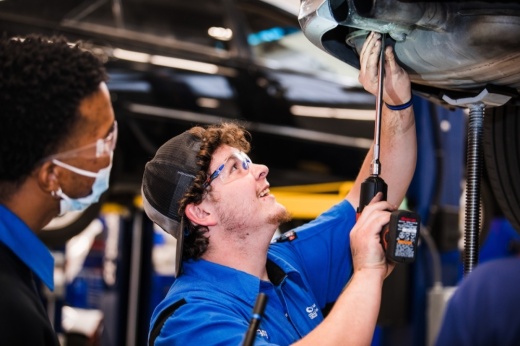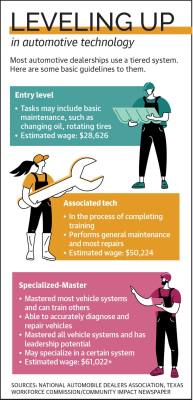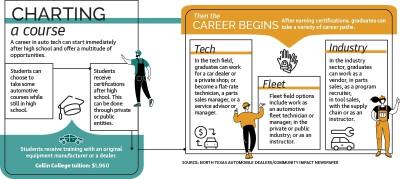In the post-pandemic world, the automotive industry is struggling to find employees, area officials said. Universal Technical Institute representatives predict a wave of older mechanics retiring will create 100,000 auto technician job openings over the next decade. The Bureau of Labor Statistics projected a 4% decline in employment in the field through 2029, according to a 2022 study conducted by software as a service platform for the insurance industry CCC Intelligent Solutions Inc.
But with its program and its accreditation, Collin College is training up a new generation of technicians to serve Collin County and cities like McKinney.
“Our classes are in high demand,” said Elias Alba, Collin College’s interim director of automotive and collision technology. “Our classes filled up so quickly I had to open up a new section.”
The Automotive Technology program offers a full degree program and certificate programs that prepare students for certification in Maintenance and Light Repair, Automotive Service Technician, or Master Automobile Service Technology designations.
Bill King, provost of the Technical Campus, said accreditation was an important step in the Automotive Technology program’s development.
“This accreditation is an indicator of how seriously we take providing industry-standard training,” King said in a statement.
Prior to the pandemic, it was already a tough industry to fill positions, said Brent Franks, president with the North Texas Automobile Dealers, which serves multiple counties, including Collin. It is a challenge that has remained constant, as workers in this industry are “essential,” he said.
“Our communities are so spread out,” Franks said. “We need to have qualified technicians to fix our vehicles to maintain our ability to get our kids to school and to go to work.”
A growing problem
Collin College has several industry partners for its automotive technical program. To earn certifications, students must complete at least one internship in an automotive related job, Elias said. Partners are often reaching out to the college asking if students are available for help, he said.
“The demand for technicians is very high,” Alba said. “We have people that are retiring or leaving or left the workforce, so you can say our partners are kind of desperate, and they need a lot of technicians.”
Data from the Texas Workforce Commission shows job postings for automotive technicians was one of the top listings in Collin County, with 268 total postings between January and July. Only two other job post categories had more than that, with retail trade at 641 total postings and “other services” with 1,187 postings.
The top two cities in the county posting automotive tech job openings were McKinney and Plano. Texas Workforce Commission data shows an entry-level position in the area can earn a salary of $28,626, with an average wage of $50,224.
Technician shortages end up costing drivers more time, data shows. According to the CCC study, from 2019 to 2021 the time between the start and completion of repair has increased 2.1 days. It is also taking longer to get an appointment to bring a vehicle in for repairs, with 96% of the shops in the study reporting in 2021 they had backlogs of two weeks.
“A work shortage would mean people won’t be able to get their cars fixed, their fire engines fixed, their emergency vehicles fixed,” Franks said.
A changing industry
The Body Shop Collision Center in McKinney is a family-owned and -operated automotive repair center that has been in business since 1976. Owner John Rattan and his daughter Jessica Rattan, who is the shop’s director of marketing and communications, are focused on maintaining their unique company culture and values, Jessica Rattan said. That has not exempted them from staffing struggles.
“I’m kind of looking for the next generation workforce, because it’s a little bit of a dying industry, so we have to get creative,” Jessica Rattan said.
Finding skilled and well-trained employees is the goal, but finding any employees seems to be a recurring problem, Jessica Rattan said. Despite some employees having been with The Body Shop Collision Center for more than 25 years, they continue to need new talent. Jessica Rattan said Collin College has been helpful in that regard.
Blake Sellers, co-owner of Honest-1 Auto Care in McKinney, has seen similar problems across the industry. He said he and his other co-owner have “managed to work [their] way through it,” but it continues to be a “standing problem” to find reliable and experienced automotive technicians. Among nationwide staffing shortages, Sellers proposes the industry may not seem desirable to younger people entering the workforce.
“There simply aren’t as many people ... that are moving into more of a technical trade career as there used to be,” he said.
Cars have become more electrical than they were two decades ago, said Sean Boyll, professor of Automotive Technology at the college. This has led to one of the key challenges with finding skilled workers in this field, according to the CCC study. The development of electric vehicles has added a new element to repairing vehicles, but also fuel-burning cars now have electrical components to consider.
“All the mechanical parts have gotten to a point where the maintenance is fairly minimal,” Boyll said.
The challenge associated with electric vehicles not only adds an extra layer of training, but it also can require more time spent by technicians performing scans and calibrations, researching repair methods and even recharging electric vehicles, the CCC study stated.
Fueling a shift
The accreditation has created even more student interest in the program, Alba said.
During the spring semester, the Automotive Technology Program at Collin College had about 123 new and continuing students enrolled in the program, according to data from the college.
At the start of the new fall semester, the program had 189 new and continuing students, including general population college students as well as about 25 dual-credit high school students, Boyll said.
Since the program began in 2020, enrollment has more than doubled, data shows.
Jobs in automotive technology cannot be outsourced, Alba said, so students going into the program know they will have jobs available right at home. In addition, a career in the field can be high-paying, he said.
The career paths in automotive tech vary as well, Boyll said.
“You can go any direction you want; you don’t have to turn a wrench,” Boyll said, adding that people can go into customer service with their certifications, automotive engineering or working with automotive manufacturers and the various positions that they can offer.
“The sky’s the limit for somebody coming into this industry,” Alba said.








